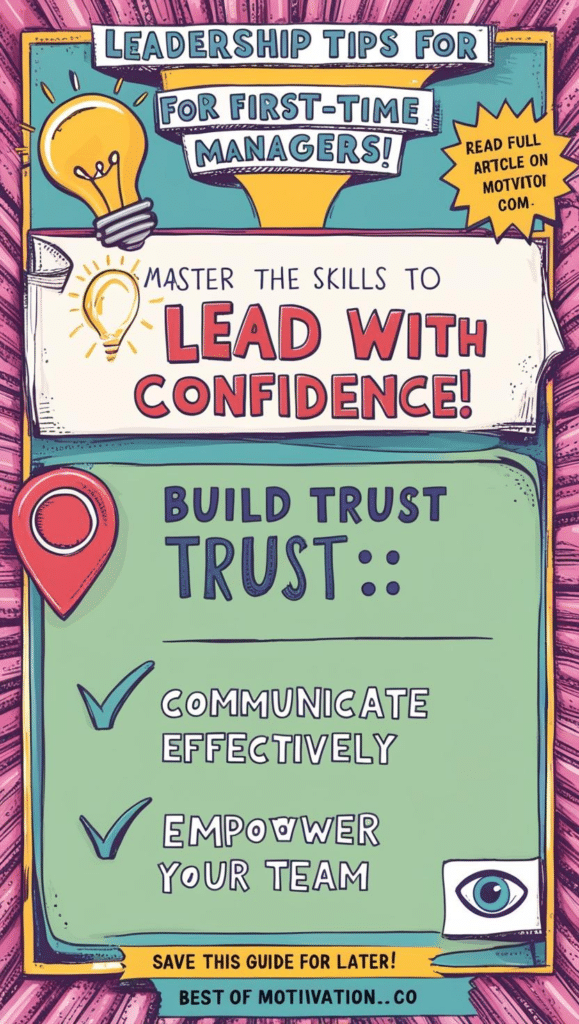The Leap into Leadership 🚀
Stepping into a leadership role for the first time can feel like navigating uncharted waters. Your responsibilities shift from focusing solely on your work to guiding and inspiring a team toward shared goals. It’s a mix of excitement and challenges, but with the right approach, you can not only survive but thrive as a first-time manager.
In this guide, we’ll unpack proven strategies, tools, and tips to help you become an exceptional leader. Whether you’re just starting or looking for actionable advice, this article is packed with everything you need. Save it 📌—you’ll want to revisit these insights!
On this article
- Key Takeaways 📖
- 1. Embrace the Shift: From Individual Contributor to Leader 🧩
- 2. Communicate with Clarity and Confidence 🗣️
- 3. Build Trust and Relationships 🤝
- 4. Develop Emotional Intelligence (EQ) 🌱
- 5. Master Time Management ⏳
- 6. Continuously Learn and Grow 📚
- 7. Handle Challenges with Grace and Confidence 💡
- 8. Empower Your Team to Shine 🌟
- 9. Measure Success and Celebrate 🎉
- Conclusion: Your Leadership Journey Begins Now 🚀
- FAQ: Leadership Tips for First-Time Managers
Key Takeaways 📖
- Transition smoothly from individual contributor to leader.
- Master essential leadership skills like communication, trust-building, and time management.
- Gain practical solutions for common first-time manager challenges.
1. Embrace the Shift: From Individual Contributor to Leader 🧩
Understanding the Change
As a manager, your success is measured by how well your team performs—not just your individual contributions. You must pivot your mindset to focus on empowering others while keeping the big picture in mind.
Key Challenges
- Letting go of control: Delegating tasks can feel uncomfortable at first.
- Learning to guide rather than do: Coaching replaces doing the work yourself.
- Balancing leadership with technical expertise: Staying involved without micromanaging.
Actionable Steps
- Delegate Effectively: Assign tasks based on team members’ strengths.
- Set Clear Expectations: Use tools like job descriptions or project charters to outline roles.
- Empower Others: Trust your team to handle responsibilities without constant oversight.
🛠️ Tool Tip: Platforms like Trello and ClickUp streamline delegation and tracking.
2. Communicate with Clarity and Confidence 🗣️
Why Communication Matters
Leadership hinges on your ability to convey vision, goals, and feedback effectively. Miscommunication often leads to confusion, reduced morale, and wasted effort.
Common Pitfalls
- Unclear instructions.
- Inconsistent messaging.
- Avoiding difficult conversations.
Actionable Steps
- Be Transparent: Share the “why” behind decisions to build trust.
- Listen Actively: Ask questions, paraphrase responses, and validate team input.
- Set Regular Check-Ins: Weekly one-on-ones ensure alignment and foster rapport.
💡 Pro Tip: Use Slack or Microsoft Teams for structured team updates and communication.
3. Build Trust and Relationships 🤝
Why Trust is Foundational
Teams perform best when they trust their leader. Without it, collaboration and morale suffer.
Steps to Build Trust
- Lead by Example: Demonstrate integrity and consistency in your actions.
- Show Empathy: Understand and address individual team members’ challenges.
- Be Approachable: Foster open dialogue by making yourself available.
Celebrating Wins
- Acknowledge individual and team accomplishments publicly.
- Use tools like Bonusly for instant recognition and rewards.
4. Develop Emotional Intelligence (EQ) 🌱
What is EQ?
Emotional Intelligence is the ability to recognize, understand, and manage your emotions and those of others. It’s critical for conflict resolution, relationship building, and decision-making.
How to Boost EQ
- Self-Reflect Regularly: Use journals or apps like the Mood Meter App to track emotions.
- Practice Empathy: Put yourself in your team’s shoes to understand their perspective.
- Stay Calm Under Pressure: Practice mindfulness or breathing exercises during stressful situations.
5. Master Time Management ⏳
Why Time Matters More as a Leader
As a manager, your calendar will fill up quickly with meetings, reviews, and planning sessions. Effective time management ensures you can support your team while driving projects forward.
Strategies for Success
- Plan Your Day: Use the Eisenhower Matrix to prioritize tasks based on urgency and importance.
- Set Boundaries: Block “focus time” on your calendar to avoid constant interruptions.
- Automate Repetitive Tasks: Utilize tools like Zapier to save time.
💻 Tool Tip: Asana or Notion are excellent for managing team projects and personal tasks.
6. Continuously Learn and Grow 📚
Why Lifelong Learning is Essential
Leadership is an evolving skill set. Staying informed about new trends and strategies keeps you effective and relevant.
Ways to Learn
- Books: Start with The Making of a Manager by Julie Zhuo.
- Podcasts: Listen to The Manager Tools Podcast.
- Workshops and Webinars: Sites like Coursera offer affordable courses.
7. Handle Challenges with Grace and Confidence 💡
Common Challenges for New Managers
- Addressing underperformance.
- Balancing team dynamics.
- Navigating office politics.
Framework for Problem-Solving
- Pause: Avoid making decisions in haste.
- Assess: Gather all relevant information.
- Act: Decide and communicate the solution clearly.
🛠️ Tool Tip: Use Miro for collaborative brainstorming to solve team challenges.
8. Empower Your Team to Shine 🌟
Benefits of Empowerment
- Boosts morale and ownership.
- Develops team members’ skills and confidence.
- Frees up your time to focus on strategy.
Steps to Empower
- Provide Training: Invest in upskilling opportunities.
- Encourage Autonomy: Allow team members to make decisions within their scope.
- Give Constructive Feedback: Regularly share actionable insights for improvement.
🔗 External Resource: Explore resources like LinkedIn Learning to support team development.
9. Measure Success and Celebrate 🎉
Measuring Team Success
- Track KPIs that align with team and company goals.
- Use performance reviews to evaluate progress.
Celebrate Milestones
- Host team lunches or virtual celebrations.
- Use tools like TeamRetro for retrospectives to identify wins.
Leadership Essentials for First-Time Managers
| 🧩 Key Focus | 💡 Actionable Tips | 🛠️ Tools to Use |
|---|---|---|
| Shift to Leadership | Delegate, empower, and align goals. | Trello |
| Master Communication | Be transparent, encourage feedback. | Slack |
| Build Trust | Lead by example, show empathy. | Bonusly |
| Develop EQ | Practice self-awareness, manage conflicts. | Mood Meter |
| Manage Time | Prioritize and automate tasks. | Asana |
| Foster Learning | Leverage books, podcasts, and courses. | Coursera |
| Empower Your Team | Encourage autonomy, provide feedback. | LinkedIn Learning |
| Celebrate Success | Host events, recognize achievements. | TeamRetro |
Conclusion: Your Leadership Journey Begins Now 🚀
Becoming a successful first-time manager is a rewarding journey. By mastering communication, fostering trust, and empowering your team, you’ll set the stage for long-term success.
Don’t stop here—start applying these tips today! Bookmark this article, share it with fellow first-time leaders, and explore our other resources for leadership development.
🔗 External Resource: For more insights, visit Harvard Business Review’s Leadership Resources.
💾 Click the Pin to Save It for Later!

FAQ: Leadership Tips for First-Time Managers
1. What are the first steps for first-time managers?
Answer:
The first steps include:
- Building trust with your team.
- Understanding your new responsibilities.
- Setting clear expectations.
- Establishing open and transparent communication.
Start by listening to your team, identifying their strengths, and aligning their efforts with organizational goals.
2. How can first-time managers improve their communication skills?
Answer:
To improve communication:
- Practice active listening.
- Be transparent and concise when sharing goals or feedback.
- Use tools like Slack or Microsoft Teams for streamlined communication.
- Schedule regular check-ins with individual team members to foster rapport.
3. What challenges do first-time managers commonly face, and how can they overcome them?
Answer:
Common Challenges:
- Transitioning from individual contributor to team leader.
- Balancing technical tasks with leadership responsibilities.
- Handling conflicts or underperformance.
Solutions:
- Delegate tasks based on team strengths.
- Approach conflicts calmly and focus on solutions.
- Seek mentorship or guidance from experienced leaders.
4. Why is emotional intelligence (EQ) important for first-time managers?
Answer:
Emotional intelligence allows managers to:
- Recognize and manage their own emotions.
- Understand the feelings of team members.
- Build stronger relationships and resolve conflicts effectively.
EQ fosters a positive work environment and enhances decision-making.
5. What tools can help first-time managers succeed?
Answer:
Here are some essential tools:
- Trello or Asana: For task management and delegation.
- Slack: For effective team communication.
- Mood Meter App: To track and improve emotional intelligence.
- LinkedIn Learning: For leadership and professional development.
6. How can new managers build trust with their team?
Answer:
Trust can be built by:
- Leading by example with integrity and consistency.
- Showing empathy and understanding team members’ challenges.
- Celebrating team achievements and recognizing individual contributions.
7. How can first-time managers empower their teams?
Answer:
To empower your team:
- Delegate meaningful tasks to foster autonomy.
- Provide regular feedback and guidance.
- Invest in their professional development through training and upskilling opportunities.
Empowerment boosts team morale and drives better performance.
8. How should first-time managers handle underperformance?
Answer:
Steps to Address Underperformance:
- Identify the root cause through open dialogue.
- Provide constructive feedback and clear expectations.
- Create a performance improvement plan with specific goals and timelines.
- Offer support through coaching or additional training.
9. What is the role of continuous learning in leadership?
Answer:
Continuous learning keeps managers informed about:
- New leadership strategies and best practices.
- Evolving industry trends.
- Skills needed to address new challenges.
Resources like books (Leaders Eat Last by Simon Sinek), online courses (via Coursera), and podcasts (Manager Tools) are excellent for self-development.
10. How can first-time managers celebrate team success effectively?
Answer:
Effective ways to celebrate include:
- Hosting team lunches or virtual happy hours.
- Acknowledging achievements in team meetings or newsletters.
- Using tools like Bonusly for instant recognition and rewards.
- Personalizing recognition based on individual preferences.
Celebrating success fosters a sense of appreciation and strengthens team morale.
Feel free to share this FAQ with your team or use it as a quick reference for common first-time management challenges!












